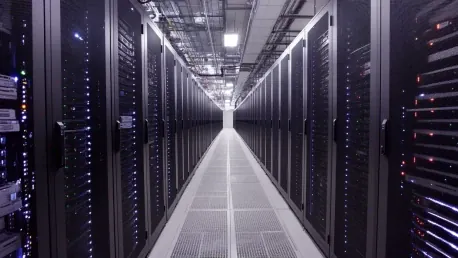The rapid evolution of artificial intelligence (AI) is reshaping various industries, and data centers are no exception. Arista Networks, a leader in cloud and data center networking technology, is at the forefront of this transformation. During the company’s third-quarter financial call, CEO Jayshree Ullal expressed optimism about the acceleration of AI pilot projects and potential revenue growth from AI-based networking, which is forecasted to generate an additional $1.5 billion in revenue through 2025. Arista posted third-quarter revenue of $1.811 billion, reflecting a 7.1% increase compared to the second quarter of 2024 and a 20% increase compared to the third quarter of 2023. Ullal emphasized that large cloud customers are not only refreshing their cloud infrastructure but also pivoting aggressively toward AI. This shift is mirrored in Arista’s activities, as the company has between 10 to 15 enterprise accounts piloting AI networks, with a particular focus on utilizing GPUs. However, these enterprise trials involve relatively low numbers of GPUs compared to hyperscale trials, which are expected to escalate to 100,000 GPUs or more.
The Surge in AI Pilot Projects
Within the scope of these pilot projects, four out of five trials have shown significant progress. Ullal highlighted that three customers are transitioning from trials to full pilots this year, anticipating the formation of GPU clusters consisting of 50,000 to 200,000 GPUs by 2025. One of the remaining pilots is in the initial stages, while another is in a steady state with expectations of advancement in 2025. Such accelerated progress is significant, showing a clear trajectory towards AI dominance in data centers. Most of Arista’s trials currently rely on 400GB Ethernet technology for networking GPUs, although there are early trials involving 800GB technology. Ullal noted that the 800GB ecosystem is not fully established yet but expects a more balanced adoption between 400GB and 800GB networks as they move into 2025.
These statements align with research from the Dell’Oro Group, forecasting a rapid increase in AI networking speeds. They predict that AI cluster networking speeds will evolve from 200/400/800 Gbps today to over 1 Tbps shortly. By 2025, the majority of ports in AI networks are expected to operate at 800 Gbps, and by 2027, 1600 Gbps will become the norm as bandwidth demands accelerate with the rise of AI technologies. This anticipated progression underscores the urgency for companies like Arista to innovate swiftly and remain competitive in an increasingly AI-driven technological landscape. Ullal’s comments come at a critical time when many enterprises are recognizing the strategic benefits of AI integration for enhanced data processing and efficiency.
High-Capacity Networking Products
Arista’s strategic approach includes developing key products to meet the growing networking demands: the Arista 7700 R4 Distributed EtherLink Switch, the 7800 R4 Spine Switch, and the 7600X6 Leaf Switch, all of which support 800GB as well as 400GB optical links. These platforms enable large-scale AI clusters by optimizing network density and minimizing network tiers, offering flexible deployment options tailored to customer needs. The 7700 R4, for instance, is designed to handle massive AI data flows, ensuring that high-speed, low-latency connections are maintained even as data volumes soar.
The Arista 7700 R4 Distributed EtherLink Switch, co-developed with Facebook’s parent company Meta Platforms, will be deployed in Meta’s Disaggregated Scalable Fabric (DSF), supporting around 100,000 DPUs. The 7700 R4 AI Distributed EtherLink Switch (DES) is designed for massive AI clusters, providing parallel distributed scheduling and congestion-free traffic based on the Jericho3-AI architecture. This kind of forward-thinking product design ensures that as AI demands grow, so too will the capabilities of the underlying network infrastructure. Additionally, Arista’s 7060X6 AI Leaf Switch, featuring Broadcom Tomahawk 5 silicon, offers a capacity of 51.2 Tbps and supports 64 800G or 128 400G Ethernet ports.
The 7800 R4 AI Spine utilizes Broadcom Jericho3-AI processors with an AI-optimized packet pipeline and supports up to 460 Tbps in a single chassis, corresponding to 576 800G or 1152 400G Ethernet ports, showcasing Arista’s commitment to high-capacity, AI-optimized networking solutions. By catering to these advanced specifications, Arista ensures that their clients can handle the most demanding AI tasks with unparalleled efficiency. The breadth of these developments also illustrates Arista’s proactive stance in addressing the future needs of data centers, making the company a central figure in the AI networking revolution.
Comprehensive Approach to Network Design
The rapid advancements in artificial intelligence (AI) are transforming many sectors, including data centers. Arista Networks, a leader in cloud and data center networking, is advancing this shift. During their third-quarter financial call, CEO Jayshree Ullal highlighted the acceleration of AI pilot projects and anticipated revenue growth from AI-based networking, predicted to add $1.5 billion in revenue by 2025. Arista’s third-quarter revenue was $1.811 billion, a 7.1% increase from the second quarter of 2024 and a 20% rise from the third quarter of 2023. Ullal pointed out that large cloud customers are not only upgrading their cloud infrastructure but also moving decisively toward AI integration. Arista has 10 to 15 enterprise accounts currently testing AI networks, focusing particularly on GPU utilization. However, these enterprise trials involve relatively few GPUs compared to hyperscale trials, which are expected to ramp up to 100,000 GPUs or more, demonstrating the significant scale of AI adoption.









